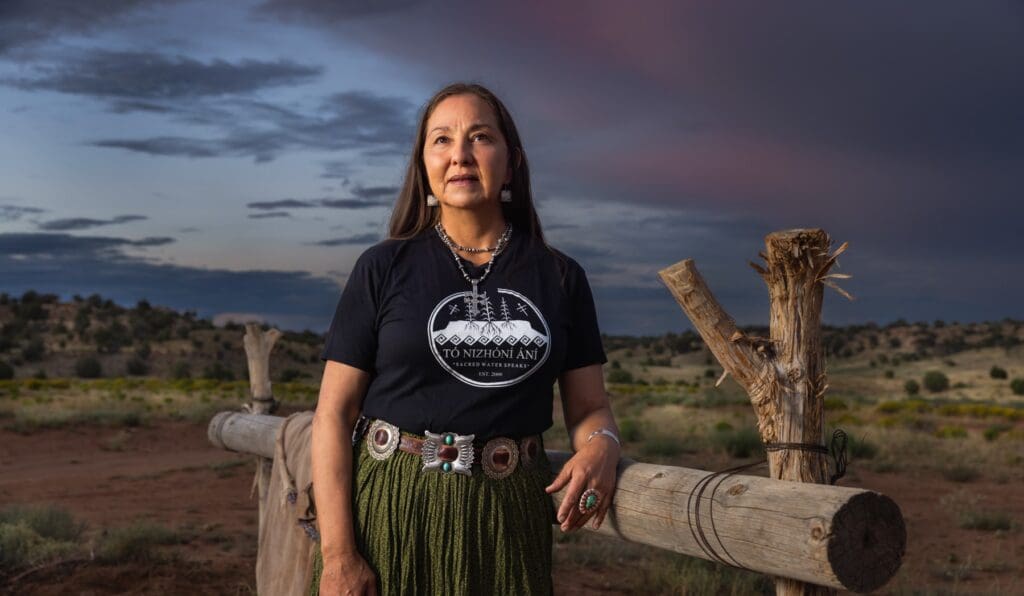
PITTSBURGH, September 20, 2023 — The Heinz Family Foundation today named Nicole Horseherder, co-founder, Tó Nizhóní Ání (Sacred Water Speaks), and Colette Pichon Battle, co-founder of Taproot Earth and former executive director of the Gulf Coast Center for Law & Policy, recipients of the prestigious 28th Heinz Awards for the Environment. As part of the accolade, Ms. Horseherder and Ms. Pichon Battle will each receive an unrestricted cash award of $250,000.
Nicole Horseherder is an energy justice leader working to protect the water, air and landscapes of the Navajo Nation and position the region to transition to and produce renewable energy. Ms. Horseherder, Diné, of the Navajo Nation, is the co-founder and executive director of the nonprofit Tó Nizhóní Ání (TNA), which works to protect the aquifers, streams and land of Black Mesa, Arizona, and to bring power to Indigenous communities suffering the environmental effects of decades of coal extraction.
Returning to her community in Black Mesa after college, Ms. Horseherder learned that years of mining by the Peabody Western Coal Company had depressurized and drained the region’s aquifer, the only source of drinking water, as well as her family’s livestock springs. Research revealed that the Peabody Mine was depleting the Navajo Aquifer of 3 to 4 million gallons of pristine water per day for a slurry line to transport coal, while also exposing nearby residents to heavy metal-laden coal dust. Additional coal mining agreements in place since the 1960s were also exploiting Indigenous land and water to benefit growing populations in Arizona, Nevada and California. And while extracted coal was lighting nearby cities, those residing in Navajo and Hopi lands lacked access to electricity due to the exclusion of Indigenous nations in the Rural Electrification Act of the early 1900s.
Encouraged by a local Indigenous leader to take up the cause, Ms. Horseherder, her husband Marshall Johnson and community member Valencia Edgewater established TNA as a nonprofit in 2001. Four years later, with the coordinated efforts of partners such as the Black Mesa Trust, TNA successfully shut down the Black Mesa mine, ending Peabody’s industrial use of the aquifer. In 2019, the Navajo Generating Station, the largest coal-fired power plant in the western U.S. and the largest source of nitrogen dioxide pollution in the country, was shut down, in part due to TNA’s ongoing efforts.
With a depleted aquifer, polluted land, less precipitation due to climate change and the region’s coal economy fading, TNA is now focused on financing a just transition to clean energy production and transmission. The organization is also working on the decommissioning and complete cleanup of the Navajo Generating Station site and repatriation of artifacts and ancestral remains removed when mining began. Under Ms. Horseherder’s leadership, TNA initiated an agreement between the Navajo Nation and the City of Los Angeles Department of Water and Power to identify Navajo land for renewable energy development. As of 2022, three large-scale Navajo solar facilities are in place, with another to be completed this year. She has testified before the U.S. House Natural Resources Subcommittee on Energy and Mineral Resources regarding the slow progress and deficiencies in cleaning up closed coal mines and the need to ensure that reclamation efforts are enforced.
To advance her vision, Ms. Horseherder has confronted coal companies, private interests, and even her own neighbors and tribal leaders. She notes that hydrologists have said it will be many years before the groundwater returns to the seeps and springs of the Navajo Nation and that some seeps and springs may never regenerate.
“As Indigenous people and nations, we must stay out in front, developing our communities and guiding transition away from fossil fuel. We cannot repeat the same business structures as before. New partnerships must be mutually beneficial. There must be meaningful community engagement and direct community benefits. Most importantly it must not come at the cost of our water and our people’s way of life. More than ever, Indigenous knowledge is needed to ensure our survival.”
– Nicole Horseherder
Ms. Horseherder and her family reside in an off-grid home, where she lives according to Diné fundamental principles that emphasize stewardship of the land and living in balance with the environment. New projects include a focus on regenerative agriculture and the teaching of Indigenous farming techniques.
“We honor Nicole for her courage in fighting to reclaim and protect the precious land and water resources that sustain the lives of the Indigenous people of Black Mesa and to ensure a just and equitable transition to clean energy in the region.”
– Teresa Heinz, Chairman, Heinz Family Foundation
“Our country’s dark history of exploiting our land, our finite natural resources and our people must end, and through her work with Tó Nizhóní Ání, Nicole is leading at a time of reckoning and renewal. With wisdom, grit and grace, she is bringing into the light that which has been taken, confronting those accountable and holding them responsible for correcting past wrongs. She is a force to be reckoned with and a wonderful embodiment of the spirit of the Heinz Awards.”
– Teresa Heinz, Chairman, Heinz Family Foundation
See the link for the rest of the Heinz Awards recipients of the 28th Awards 2023.
